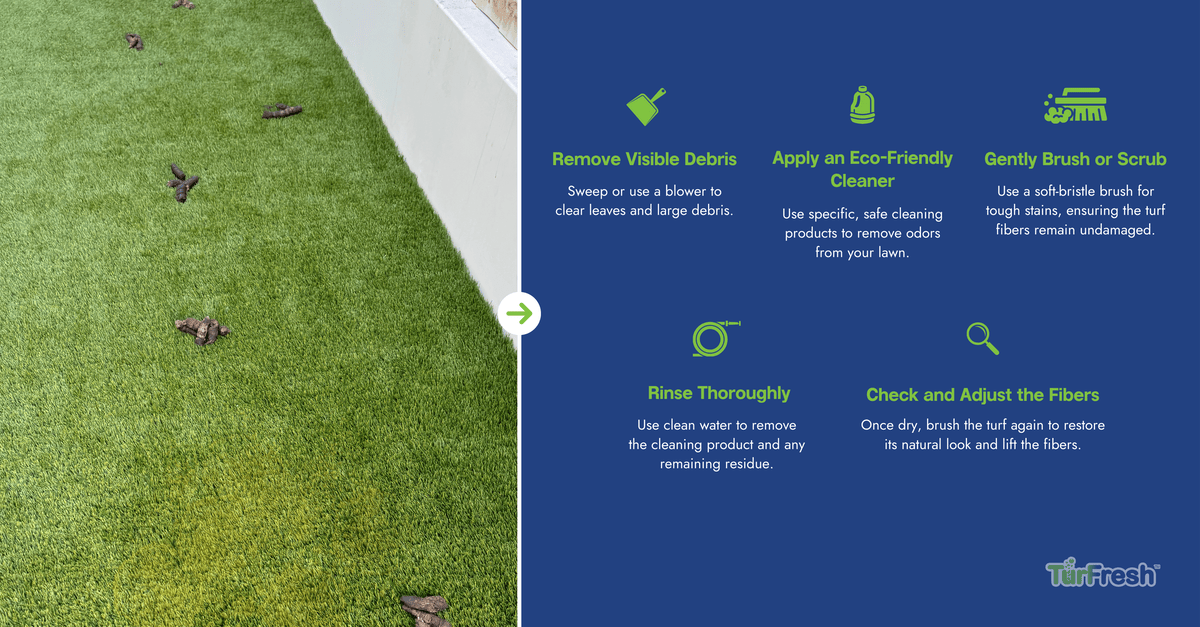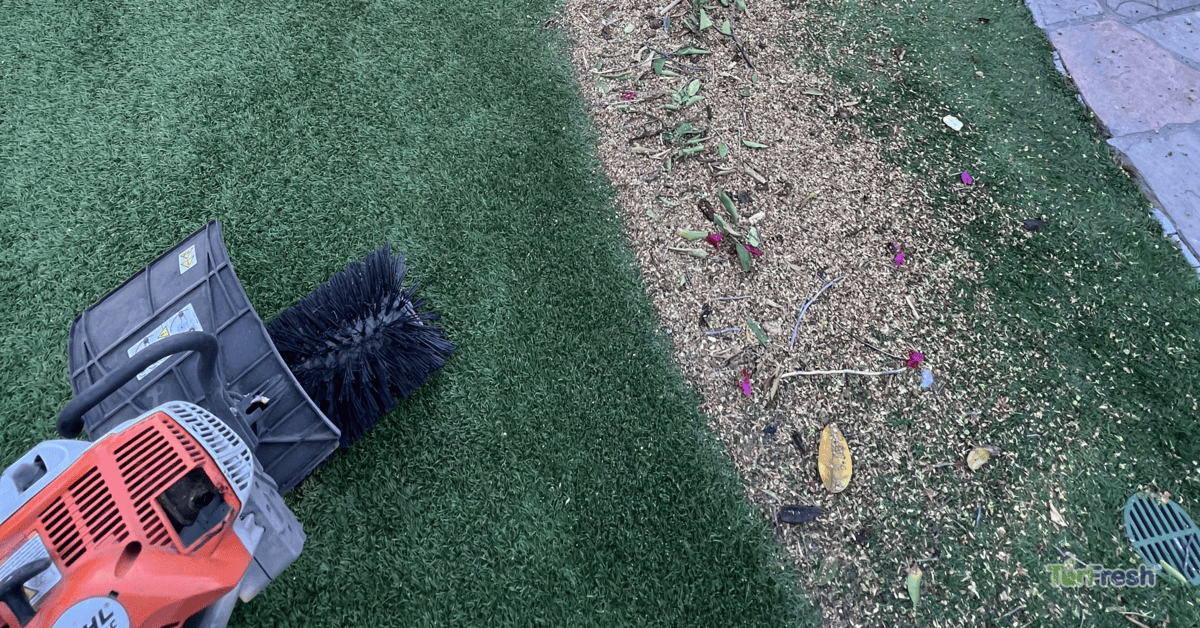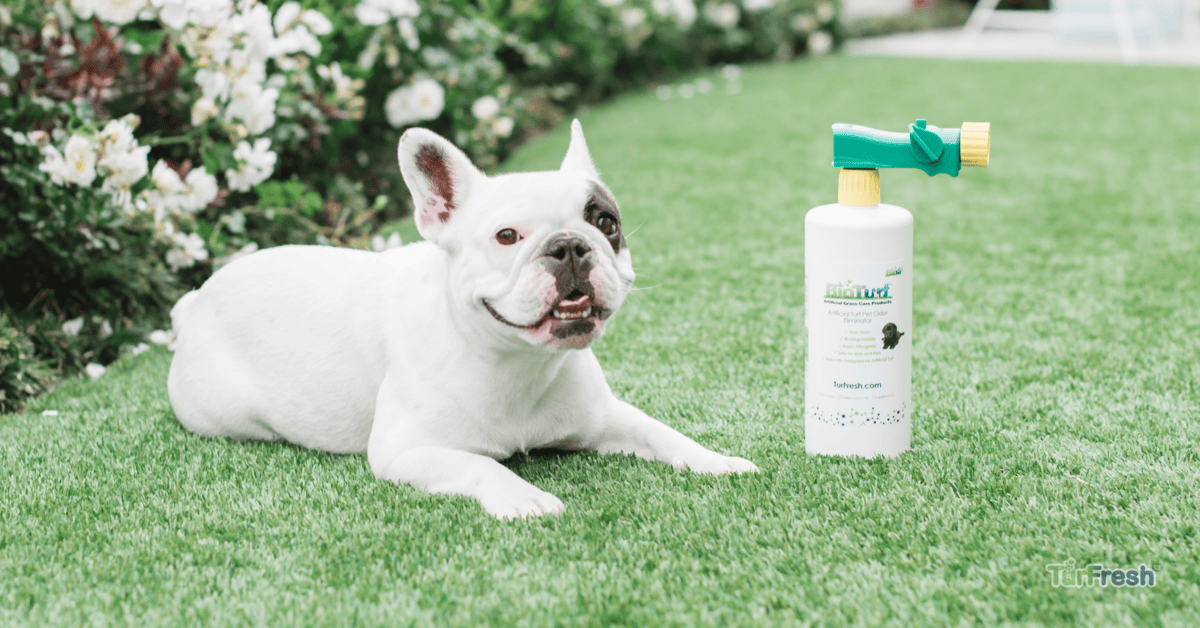How to Eliminate Pet Odors in Artificial Turf in Phoenix
Many pet owners face a common problem: pet odors in artificial turf. These odors can quickly turn your beautiful lawn into an unpleasant space. Whether you have a dog, cat, or other pets, eliminating pet odors in artificial turf is important for keeping your outdoor space clean and comfortable. Neglecting this issue can lead to smelly, unhygienic conditions.
In this guide, we’ll explore simple and effective ways to eliminate pet odors and maintain a fresh artificial lawn.
Why Pet Odors Are Common on Artificial Turf
Causes of Odors
Unlike natural grass, artificial turf in Phoenix does not absorb moisture. This means that when pets urinate or defecate, the waste doesn’t break down naturally. Instead, bacteria thrive in the organic matter left behind, creating unpleasant odors. The main causes of these odors include:
- Pet waste (urine and feces): When not cleaned up promptly, these create the perfect environment for bacteria to thrive.
- Bacterial breakdown: Pet urine contains ammonia, which bacteria break down into a variety of odor-causing compounds.
- Lack of moisture absorption: Unlike real grass, artificial turf can’t absorb liquids, causing them to sit on the surface and linger.
Phoenix’s Unique Climate
In places like Phoenix, the problem is even more pronounced due to the hot and dry climate. High temperatures encourage bacterial growth, and the lack of rain means there’s no natural washing away of waste. As a result, odor removal in artificial grass can be more challenging. You’ll need to take extra steps to maintain a clean and fresh lawn, especially in the summer months.
Top 5 Ways to Eliminate Pet Odors in Artificial Turf
1. Regular Cleaning Practices
The first step in eliminating pet odors in artificial turf is establishing a routine cleaning schedule.
| Cleaning Task | Frequency | Notes |
|---|---|---|
| Remove solid waste | Daily | Pick up pet waste as soon as possible to prevent buildup. |
| Rinse the turf with water | Weekly | Use a hose to rinse urine and dirt off the turf. |
Tip: The sooner you clean up waste, the less chance bacteria have to form and create strong odors.
2. Using Pet-Friendly Cleaning Products
If you’re using cleaning products, make sure they are safe for pets and effective at neutralizing odors. Choose enzyme-based cleaners. They break down bacteria and neutralize the smells.
| Product Type | Purpose |
|---|---|
Enzyme-based cleaners |
Break down waste and neutralize odors. |
| Pet-safe disinfectants | Safe for pets while eliminating bacteria. |
These products are effective because they target the source of the odor—bacteria and organic waste—without harming your pets.
3. Installing Proper Drainage
Good drainage helps prevent moisture buildup and the accumulation of waste in the turf. When water can’t drain properly, urine and waste sit in the fibers, leading to bacteria growth. Installing or upgrading your turf’s drainage system is one of the most effective ways to eliminate pet odors in artificial turf.
| Drainage System Feature | Benefits |
|---|---|
| Properly sloped base | Allows liquids to drain easily, preventing waste buildup. |
| Perforated backing | Ensures water flows through the turf to wash away waste. |
Tip: Installing turf with a good drainage system can significantly reduce maintenance and odors in the long run.
4. DIY Odor Neutralizers
You don’t always need store-bought cleaners to fight odors. Common household items like vinegar and baking soda can be mixed into effective cleaning solutions.
DIY Odor Neutralizer Recipe:
| Ingredient | Amount | Instructions |
|---|---|---|
| Vinegar | 1 part | Mix with water in a spray bottle. |
| Water | 2 parts | Spray mixture on the affected area. |
| Baking soda (optional) | 1 tbsp. | Sprinkle baking soda on turf after spraying. |
Steps:
- Mix vinegar and water.
- Spray the solution on the affected areas of the turf.
- Let it sit for 10-15 minutes.
- Rinse thoroughly with water.
This natural cleaner helps neutralize odors without harmful chemicals, making it safe for your pets.
5. Professional Cleaning Services
If regular cleaning isn’t enough, consider professional cleaning services like TurFresh. We use specialized equipment and cleaning solutions designed for artificial turf, which effectively removes pet odors in artificial grass.
| Service Type | Benefits |
|---|---|
| Professional cleaning | Expert cleaning targets deep odors and bacteria. |
| Eco-friendly products | They are safe and non-toxic solutions for pets and the environment. |
Hiring professionals can save time and ensure your turf gets the deep clean it needs to stay fresh.
Step-by-Step Guide to Cleaning Turf
Materials Needed:
- Hose or pressure washer
- Pet-safe cleaning products
- Scrub brush
- Bucket for DIY solutions
Step-by-Step Process:
- Remove debris and solid waste: Use a scooper or bag to pick up pet waste immediately.
- Rinse the area thoroughly: Use a hose or pressure washer to wash away urine, dirt, and any remaining waste.
- Apply cleaning products: Use pet-safe cleaning solutions or homemade cleaners to scrub areas with lingering odors.
- Rinse again: After applying the cleaner, rinse the turf to remove any excess solution.
- Allow it to dry naturally: Let the turf dry to prevent mold or new bacteria growth.
This process helps keep your turf clean and reduces odor-causing bacteria.
Preventive Measures You Can Try
Tips for Ongoing Maintenance
Preventing odors before they start is key to keeping your turf fresh.
| Tip | Explanation |
|---|---|
| Stick to a routine cleaning schedule | Regularly remove waste to stop odors from forming. |
| Spot clean immediately after accidents | Quickly clean up pet waste to prevent odors. |
| Use antimicrobial infill materials | Reduce bacterial growth under the turf. |
Infill Options: Consider using antimicrobial infill like Zeolite or antimicrobial sand to help neutralize odors before they start.
Additional Tips:
- If possible, create a designated pet area on your lawn. This makes it easier to clean up waste and reduces the chances of widespread odors.
- If your turf gets a lot of traffic, consider using a turf cleaning solution after every major cleaning to ensure it stays fresh.
Recommended Products for Turf Cleaning
Here are some of the best products to help eliminate pet odors in artificial turf:
| Product Type | Purpose |
|---|---|
| Pet-safe cleaning sprays | Neutralizes odors and cleans artificial turf. |
| Enzyme-based cleaners | Breaks down waste and eliminates odors. |
| Antimicrobial infill | Prevents bacteria growth under the turf. |
Choosing the right products can make a significant difference in maintaining a fresh, odor-free lawn.
Why Choose TurFresh for Artificial Turf Maintenance
Benefits of TurFresh Services
TurFresh is an expert in eliminating pet odors in artificial turf. Our cleaning team uses eco-friendly and pet-safe products to ensure your turf stays fresh. Whether your turf is in need of a deep clean or a simple touch-up, TurFresh has the experience and tools to handle it.
Local Expertise and Tailored Solutions
Living in Phoenix means dealing with the heat and dry climate, which can make turf care more difficult. TurFresh understands Phoenix’s unique weather and can provide tailored cleaning solutions to keep your artificial turf clean, fresh, and odor-free.
Contact Us Now to Keep Your Lawn Fresh and Safe for Your Pets
Maintaining a fresh, clean artificial turf is important for both the health of your pets and the comfort of your family. Eliminating pet odors in artificial turf can be easy with the right routine and products. Regular cleaning, proper drainage, and using the right cleaning solutions can keep your turf smelling fresh.
If the task seems overwhelming, consider professional turf cleaning services like TurFresh for deep and thorough cleaning. We are located at 3101 W Thomas Rd #107, Phoenix, AZ 85017, United States. Contact us today at (855) 444-8873 to find out more about how we can help you keep your turf clean, safe, and odor-free all year long.
Frequently Asked Question
Can artificial turf retain pet odors permanently if not cleaned?
Yes, if pet waste is not cleaned regularly, bacteria will build up and cause bad odors. Routine cleaning is essential to prevent permanent smells.
Are there natural remedies for removing pet odors from artificial turf besides vinegar?
Yes, baking soda, activated charcoal, and diluted lemon juice can help neutralize odors naturally. These options are safe for pets and effective at eliminating smells.
How does improper turf installation contribute to odor problems?
Improper installation can lead to poor drainage, causing waste and moisture to build up. This can create an environment where bacteria thrive, leading to persistent odors.
What is the best time of day to clean artificial turf in Phoenix’s climate?
Morning or late afternoon is ideal when temperatures are cooler. Cleaning during the hottest part of the day may cause cleaning solutions to evaporate too quickly.
Can artificial turf infill materials be replaced to reduce odors?
Yes, antimicrobial infill materials can help reduce odor buildup. They prevent bacterial growth under the turf.
How do you prevent turf discoloration caused by pet waste?
Clean up pet waste to prevent staining. Using a hose to rinse the area and regular maintenance helps minimize discoloration from urine or feces.
Are there any risks of over-cleaning artificial turf?
Over-cleaning can damage the turf fibers or wash away protective coatings. It’s important to follow the recommended cleaning schedule without excessive scrubbing.
How can I train my pet to use specific areas of artificial turf?
Create a designated area with clear boundaries and consistently reward your pet when they use that spot. Training and patience are key.
What signs indicate it’s time for professional turf cleaning services?
If odors continue despite regular cleaning, or if the turf is stained or damaged, it’s time to hire professionals for a deep clean. They can effectively address persistent issues and restore your turf.
Is it safe to use a steam cleaner on artificial turf to eliminate pet odors?
It’s not recommended, as high heat can damage the turf fibers. Stick to pet-safe cleaners and methods that don’t involve excessive heat.



